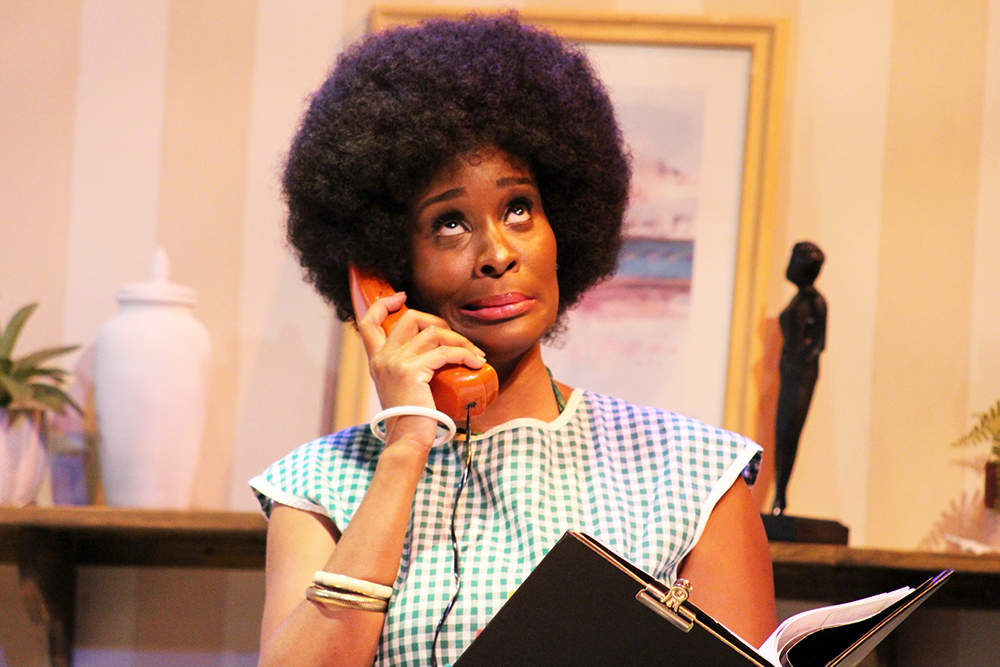I feel somewhat apprehensive writing about the world premiere of LaDarrion Williams’ new play Coco Queens at TheatreWorks@TheSquare, if only because this review seems like the last thing anyone needs right now: a white woman’s commentary about Black sisterhood. Perhaps I would be best served by simply sharing my perspective of gratitude for having the opportunity to see this story being brought to the stage.
Winner of the 2023 NewWorks@TheWorks playwriting competition, Coco Queens takes place in the 1970s, which is apparent by the cozy, lived-in set designed by Lex van Blommestein. The entirety of the play is staged in the living room/at-home hair salon of Gloria Carmichael, played by Christin Webb, who the audience was told before curtain is a recent addition to the cast, so much so that the actor isn’t quite off book yet. This detail could be a distraction to most audiences, but I found Webb’s characterization of Gloria so compelling that it took me a few minutes to realize she was the actor that had been referred to, despite the rather obvious fact that she carried a modern binder with her during much of the show.
Gloria sports an Afro hairstyle, another nod to the time frame of the show, and the play’s program includes an insert titled “The Role of Hair in the Identity of Black Women.” It’s a nice touch, given that many of the thematic elements are woven into the setting of a hair salon. Gloria serves as a matriarch to the other three characters, having raised each of them together as pseudo-sisters in their childhood. Chanel and Tammie remain in the same small town they grew up in, and once the last character Dawn is introduced, we see that she and Chanel harbor a feud that has spanned eight years. In their youth the three were part of a musical group together and were poised on the edge of their big break when Dawn suddenly broke off and started a solo career. Dawn, who recently returned home from her seemingly glamorous life as a solo artist, wants to reconcile. Chanel, who feels Dawn is living the life she was meant to have, does not. Tammie is stuck in the middle, unable to bridge the gap between the two.
Over the course of the play, we see each character struggling not only to mend the rift in their friendship but also against the different ways the world has forced them to move through their lives. The playwright exemplifies this theme with the line that being a Black woman is akin to “existing, not even living in this world.” Gloria and Tammie urge Chanel and Dawn to assert control in their lives by putting their differences behind them, but actor Donita Johnson makes it clear that Chanel’s palpable anger is stemming from a deep wound.
Playwright Williams said in a release, “I am not a Black woman, but I guess I really associate with Chanel a lot of times because of the anger and hurt caused by some folks closest to you, and learning to heal from that pain.”
Forgiveness is something hard-won, even or perhaps especially for the person giving it. Each character faces a battle with discrimination and how its effects on Black women permeate their lives, and each character in their own way comes to a point when they must decide who in their lives deserves forgiveness. In each of their coinciding stories, what’s clear is how much stronger the ties that bind them become when they choose to fight for and invest in their own strength. By choosing to embrace and support one another, they become stronger individuals. This lesson is brought home when their matriarch reminds them that she, too, has faced persecution in ways they never have, and that the time comes for everyone to invest in taking care of themselves first, even if their aim is to serve others.
Coco Queens is a heartfelt look at the everyday lives of 1970s Black women in the South, with themes that seem all too relevant in 2024.
Coco Queens runs at TheatreWorks on the Square through July 28th.
